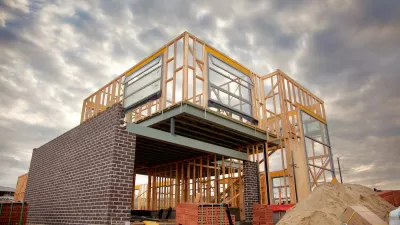Alternative models of homeownership involving shared equity may be able to offset the urban housing crunch. They include the subjects of this discussion: community land trusts and housing co-ops.

Although it often requires a high initial investment to secure land and buildings, shared-equity homeownership "can lower costs in the long run by preserving a city's affordable housing stock in perpetuity," Benjamin Schneider writes. In a primer on two popular shared-equity models, Schneider discusses the history of community land trusts (CLTs) and housing cooperatives, and goes over several examples of how residents have fared.
In the United States, CLTs own a total of about 15,000 home ownership units and 20,000 rental units. "By taking land off the real-estate market, they make the housing units they control permanently affordable. Community land trusts own the land upon which housing units are built, and sell or rent the units on top of it." Where they exist, CLTs tend to preserve some affordable options in gentrifying neighborhoods.
Co-ops are more of a mixed bag. "Since co-op tenants own the building, they can create rules that fit their needs, whether those are limited-equity agreements to keep units affordable, or arcane membership requirements that weed out the hoi polloi," Schneider writes.
Still, shared-equity homeownership is very much the exception to the norm. And for that to change, new mechanisms for funding them must become more readily available.
FULL STORY: CityLab University: Shared-Equity Homeownership

Alabama: Trump Terminates Settlements for Black Communities Harmed By Raw Sewage
Trump deemed the landmark civil rights agreement “illegal DEI and environmental justice policy.”

Study: Maui’s Plan to Convert Vacation Rentals to Long-Term Housing Could Cause Nearly $1 Billion Economic Loss
The plan would reduce visitor accommodation by 25% resulting in 1,900 jobs lost.

Why Should We Subsidize Public Transportation?
Many public transit agencies face financial stress due to rising costs, declining fare revenue, and declining subsidies. Transit advocates must provide a strong business case for increasing public transit funding.

Wind Energy on the Rise Despite Federal Policy Reversal
The Trump administration is revoking federal support for renewable energy, but demand for new projects continues unabated.

Passengers Flock to Caltrain After Electrification
The new electric trains are running faster and more reliably, leading to strong ridership growth on the Bay Area rail system.

Texas Churches Rally Behind ‘Yes in God’s Back Yard’ Legislation
Religious leaders want the state to reduce zoning regulations to streamline leasing church-owned land to housing developers.
Urban Design for Planners 1: Software Tools
This six-course series explores essential urban design concepts using open source software and equips planners with the tools they need to participate fully in the urban design process.
Planning for Universal Design
Learn the tools for implementing Universal Design in planning regulations.
Caltrans
Smith Gee Studio
Institute for Housing and Urban Development Studies (IHS)
City of Grandview
Harvard GSD Executive Education
Toledo-Lucas County Plan Commissions
Salt Lake City
NYU Wagner Graduate School of Public Service





























